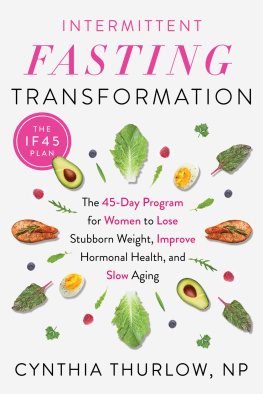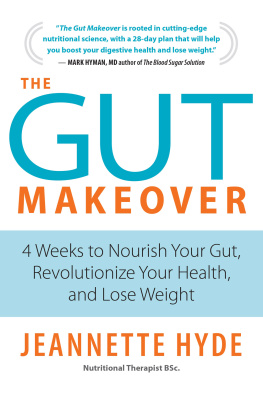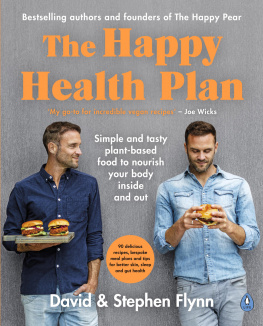
To my motherI know you would be so proud.
To my fatherThank you for giving me the opportunity to become a doctor and help others.
And to my son, AmbroseMay you always have a happy gut.
CONTENTS
Guide
Author of The Allergy Solution: The Surprising, Hidden Truth About Why You Are Sick and How to Get Well
NEW YORK, NEW YORK
T HE MAIN THING YOU want from your digestive tract is that it does its job quietly, without talking back to you. You dont want to know that its there.
As Dr. Vincent Pedre explains in Happy Gut, that job is actually much bigger than youve ever imagined. Not only is the gastrointestinal system responsible for digesting and absorbing nutrients from food and for excreting waste, it is also the largest organ of your immune system. Over two-thirds of your bodys lymphocytes (the captains of immune function) are found in the lining of the small intestine. From this base they travel throughout your body, sending signals that influence immunity in all other organs.
Your gastrointestinal tract has its own nervous system, technically called the Enteric Nervous System (ENS) and affectionately dubbed The Second Brain by aficionados. Your ENS has as many nerve cells as your spinal cord and is in constant communication with your first brain, affecting your mood and mental function.
Your alimentary canal is also home to about a hundred trillion microbes, which include a thousand different species of bacteria, a few dozen types of yeasts and fungi, an unknown number of viruses, and an occasional worm. Collectively these are called the gut microbiome. Understanding how these microbes influence human health and illness has been a major interest of mine for over three decades. In the last decade, microbiome research has blossomed into one of the most-discussed topics in applied science. Its become clear that gut microbes help us to be human. The implications of that relationship will be at the cutting edge of clinical research for decades to come.
Finally, the gastrointestinal tract is an organ of detoxification. Much of this responsibility rests with the liver, but the intestinal lining cells themselves are rich in detoxifying enzymes. The gut and liver work together to remove noxious substances derived from food, your environment, gut microbes, and even the operation of your own metabolism and hormones.
These multiple functions of the digestive system interact with each other and with the food you eat to regulate your nutritional state, your metabolic state, your mental state, your weight, your pattern of sleep, your energy, and your susceptibility to illness. Happy Gut is an engaging guide to your most complex organ system, the GI tract, and a gold mine of practical information that allows you to help this system work for you, instead of against you.
Dr. Pedre pays special attention to the practical details that allow you to apply his Gut C.A.R.E. Program effectively. If youre following his advice and wonder, How do I go about doing this?, youll find that hes anticipated your question and provided the answer. Just keep reading.
Another outstanding feature of Happy Gut is the attention it pays to important topics that dont receive enough consideration in most self-help books for digestive disorders. These include:
The Gut-Brain Connection. Dr. Pedre explains how gut microbes and gut toxins influence your brain and how your mind affects the function of your gut. The detailed descriptions of mindful eating and yoga for G.I. health are wonderful.
The benefits of stomach acid. He emphasizes the importance of stomach acid for normal digestion and describes the many dangers of acid-suppressing drugs, the third largest-selling drug category in the world.
Prebiotics. Prebiotics are food components that are not digested or absorbed in your GI tract. They travel through your gut supporting the growth of beneficial bacteria. Many people take prebiotic powders as dietary supplements. Dr. Pedre tells you how you can get them from food.
Laboratory testing. Throughout Happy Gut, youll find detailed information about laboratory testing that can help you and your doctor identify factors that are creating your symptoms. This knowledge can help you partner more effectively with your personal health care provider.
Food sensitivity. Dr. Pedre starts with a thoughtful discussion of specific foods that should be avoided and why. He then shows you how to listen to the wisdom of your body as you reintroduce foods youve removed. Understanding the difference between food sensitivity and food allergy is essential for discovering your optimal diet, which may be different from someone elses optimal diet.
If you want to improve your digestive health, you should read every word in this book.
This book is designed to give information on various medical conditions, treatments and procedures for your personal knowledge and to help you be a more informed consumer of medical and health services. It is not intended to be complete or exhaustive, nor is it a substitute for the advice of your physician. You should seek medical care promptly for any specific medical condition or problem you may have. Readers, particularly those with existing health problems and those who take prescription medications, are cautioned to consult with a health professional about specific recommendations for supplements, and the appropriate dosages.
All efforts have been made to ensure the accuracy of the information contained in this book as of the date published. The author and the publisher expressly disclaim responsibility for any adverse effects arising from the use or application of the information contained herein.
The gut is your own internal garden.
DR. MARK HYMAN
T WENTY-SIX-YEAR-OLD Julie has tried all types of diets and seen several doctors (including two gastroenterologists), but no one has offered a true solution to her symptoms. She suffers on a daily basis from gas, bloating, indigestion, and irregular or urgent bowels, sometimes having to run to the bathroom in the middle of a dinner out with friends, which causes her great embarrassment. She says that because of her unpredictable stomach, it feels like food just goes right through me. She is bloated and holding on to ten pounds she cannot easily shed.
Her discomfort began several years before we met, while she was attending college. She admits to having had not the best diet during her college years, and she frequently snacked on chips, pizza, beer, and late-night sweets while studying. There was no clear start date for her symptoms, but they slowly got worse over the years, and now Julie is at the point that she cannot get a handle on what upsets her stomach and when. She is afraid to go out because of it, and this has really put a damper on her social life. She will stay home on most weekend nights because she simply cannot predict how she will feel.
She had blood work and even a colonoscopy (a procedure where a specialist looks into the colon with a long, tubelike camera), but no test has revealed why she feels this way. When she came to see me, she was at her wits end, in tears, and wondering if she would ever feel normal again.
You may be reading Julies story and thinking, This sounds like me. Or perhaps you relate to some of her symptoms. You may have visited multiple doctors while seeking an answer to your complaints, only to find disappointmentbeing sent home either empty-handed or with a prescription for your symptoms or an antidepressant, but not with a diagnosis of the cause. Its all in my head, you think, because the doctor told you there was no identifiable physical ailment. To complicate matters more, in many cases these symptoms (gas, bloating, alternating constipation/diarrhea, and abdominal discomfort relieved by bowel movements) get placed under the umbrella term Irritable Bowel Syndrome (IBS), which gives them a name but does nothing to clarify the true cause or the treatment. This happened to Julie and may have happened to you. Many gut issues suffer the same consequences.
Next page









